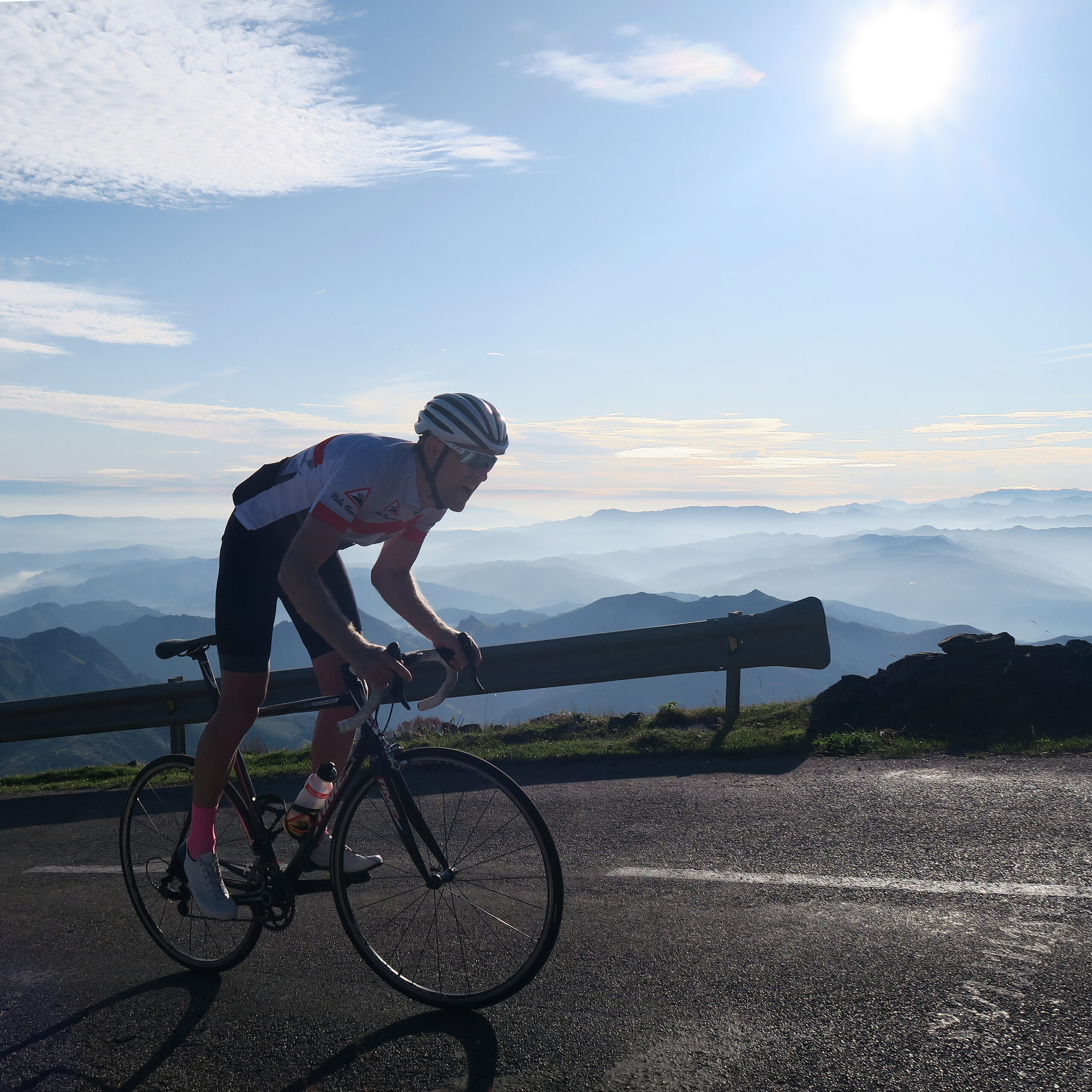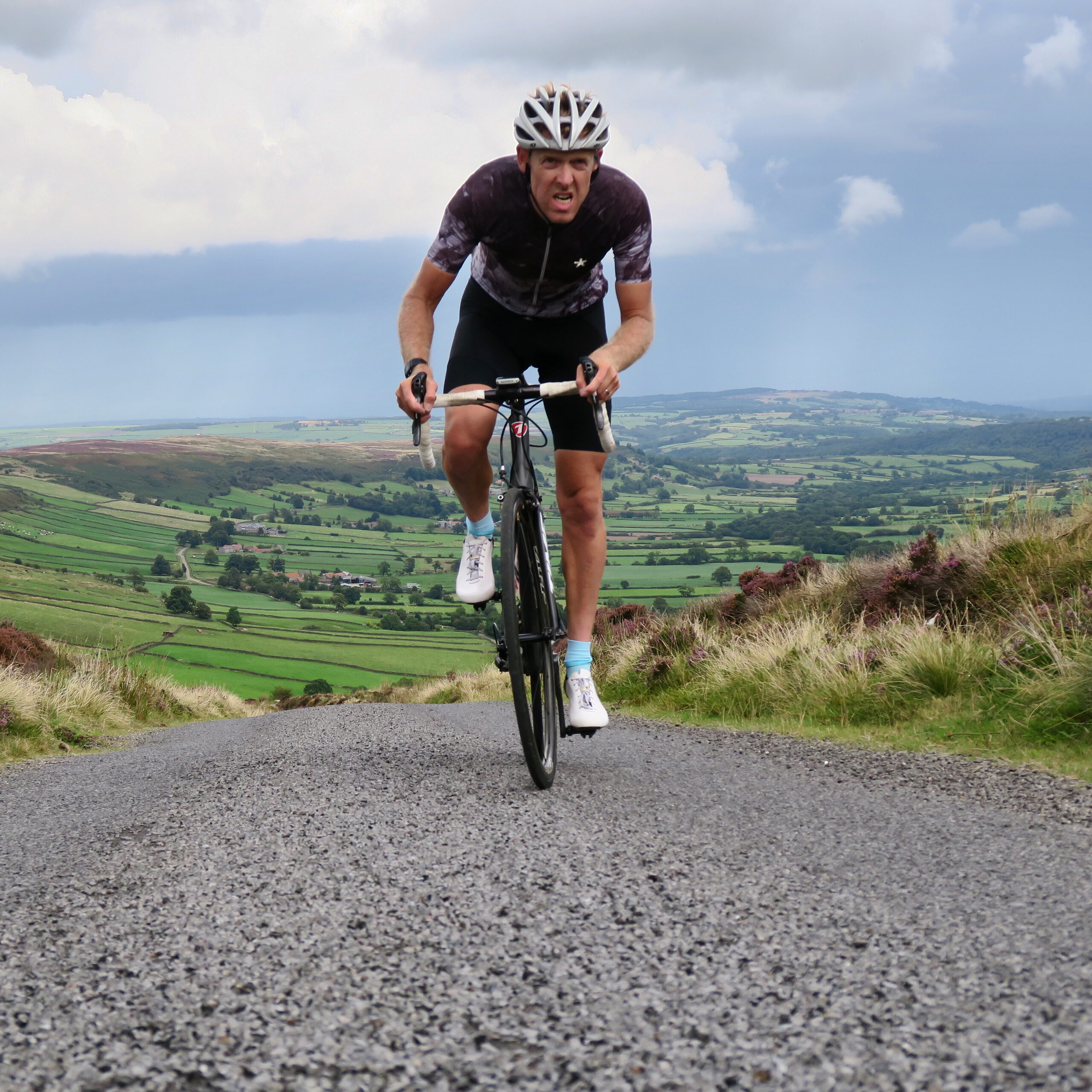King of the Mountains: An interview with Simon Warren
An avid cyclist, graphic designer and author, Simon Warren is famous for his intricate knowledge of climbs in the UK and beyond. First published in 2010, Simon’s original book 100 Greatest Cycling Climbs covers ‘lung busting city centre cobbles to leg breaking windswept mountain passes.’ There are now 12 further climbing guides, detailing stunning ascents in the UK, Belgium, France and Italy – with newly released Ride Britain just hitting the shelves and a book exploring Spain in the pipeline. We caught up with Simon to hear his cycling story and dig into his tips for climbing and descending well.
From village riding to renowned cycling author

Simon’s initial foray into cycling will be recognisable by many. “We all had bikes growing up in the village but it wasn’t until I was around 17 years old that I bought myself a racing bike,” recalls S
imon. “I had wanted to be a skateboarder to be honest, but I had zero skill”, he joked. “My first race was a 10-mile time trial. I turned up with bananas
and goodness knows what in my pockets – classic! The next week I scrubbed 3 minutes off my previous time and it quickly became an obsession. I wasn’t the fastest but I had enough talent to rub shoulders with some healthy club competition.”
A snapped knee tendon saw Simon abandon the bike for over a decade. “I got back in the saddle whilst working at Cycling Weekly and pedalled my way to a 1st category li
cense. Getting thrashed every weekend by elites and very talented teenagers, I began to brainstorm other ways I could progress in cycling beyond pure racing. I’d always been a decent climber and was often fastest up the hills, despite being the slowest on the descents! One evening I put a list of 100 climbs on a map of the UK – and the rest is history.”
With 13 climbing guide books out, there is now also an app that keen riders can download to track their quest to ‘Ride them all.’ There are 32 riders who have earned their gold badge in the 100 Climbs Club – including a record attempt, completing all 100 in 13 days. The app will identify the climb nearest to you which is a good starting point.
In pursuit of greater heights: The key to climbing well
For many riders, hills can become their nemesis. “Lots of people psych themselves out about climbing”, Simon admits. “As soon as they see the climb, they go down to a low gear and think ‘I can’t do this’.”
The key to climbing well? “Get comfortable feeling uncomfortable, especially for long climbs. Don’t be scared of a little leg and lung burn*. It won’t
be forever and the endorphins released at the top are worth it. If you can avoid it, do not put your foot down – you break your rhythm and it is hard to get started again. Do whatever it takes to keep yourself going. Sing to yourself, talk to fellow riders and count down the kilometres. I always think of the line ‘Take the pain’ from the film Platoon! Relax and enjoy any bits of flat or descent on the climb. It always feels good to clock up some free distance. Focus on the scenery – the views from the top of the mountain are always the best and they more than reward the effort to get up there. Failing all of the above, appeal to your inner competitor and think of Strava. You’ve put all this effort in, don’t waste it by giving up now!”
What goes up must go down
After you’ve taken a well-deserved breather and soaked in the beauty, it is time to tackle the descent. “Riding downhills is a different sport entirely. I could fly up the climb but then I would be hitting the brakes the whole way down. The first time I rode in the mountains, the pain in my arms was intense. I just didn’t have the confidence. There is a skill in learning to take the right line and cornering well. You also must build the ability to trust yourself and your bike. For some people, this all comes naturally – for me, I think my sense of self-preservation is too strong!” laughs Simon.
To improve, “practice makes perfect. If you can’t make it out into the big mountains, there are plenty of climbs in the UK to start honing your skills. You want to minimise the angle of any turns. If you are turning left, you’d go as far right as possible on approach – first
taking any traffic into consideration – brake before the corner and release through the apex. Really important to point out though, this is speed-oriented, not safety-oriented – your first priority is always sticking to the rules of the road. Also, you must take the weather into account and descend wet roads with caution.”
2020 is a different mountain to climb

With plans chopping and changing, 2020 has certainly thrown up some obstacles. “I was building up to the 2020 Dragon Devil Ride”, Simon tells me. “I did Dragon a long time ago but I ha
ve never ridden the Devil distance. In fact, I have never ridden 300km [186 miles] so it was going be a good challenge. I usually find I have a wobble around the 60 to 80-mile mark but after that, as long as you keep eating, you can keep pedalling! Definitely looking
forward to picking it up again in 2021.”
Looking back at previous adventures can help boost the morale. “Interestingly, my best day on a bike was probably one I was looking forward to the least”, Simon confesses. “I rode Paris Roubaix last year, having ridden 280km and 260km the two days preceding. I had never wanted to ride the cobbles of Roubaix – partly because I didn’t want to wreck my bike! It really hurt, but I have never felt so exhilarated. It is the fight club of the bicycle world and I cannot recommend it enough.”
Any loss of training motivation? “A lot of my thinking is done on the bike. Many a problem has been solved by turning the pedals and that will be the same this year, race or no race. I also built my son an indoor trainer out of odd bits of wood so we’ll be in the garage for the time being!”
—
learn more about Simon’s climbing adventures and tips, follow his blog here. Alternatively, buy the books and download the app to get prepped for some hard but rewarding hill climbing in the (hopefully!) not so distant future! You can also follow him on Instagram and Twitter.
* Referring specifically to riding your bike! In the current climate, it’s probably worth pointing out that if your feel a burn in your lungs, you should probably read NHS Covid-19 guidelines!
